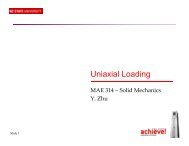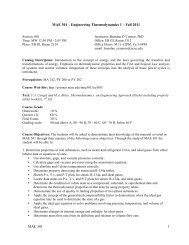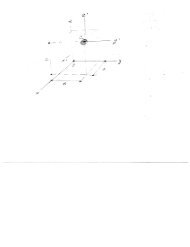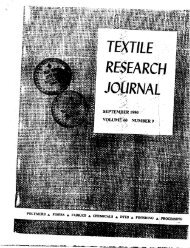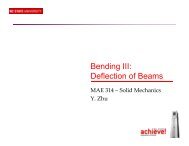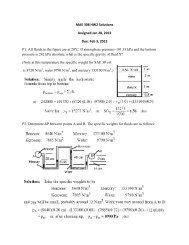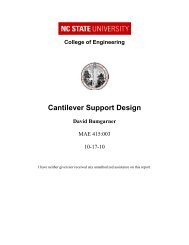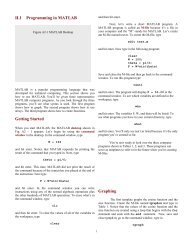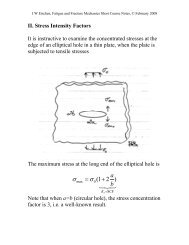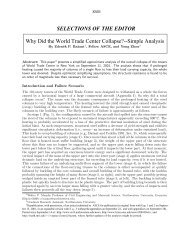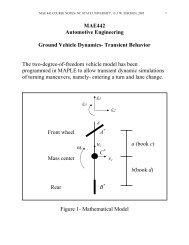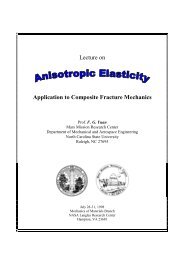The Online Ethics Center for Engineering & Science - Department of ...
The Online Ethics Center for Engineering & Science - Department of ...
The Online Ethics Center for Engineering & Science - Department of ...
You also want an ePaper? Increase the reach of your titles
YUMPU automatically turns print PDFs into web optimized ePapers that Google loves.
Undergraduate Education in Practical <strong>Ethics</strong>deciding when and whom to trust as they become independent adults.<strong>The</strong>y are <strong>of</strong>ten most interested, <strong>for</strong> example, in what they can expect indealings with health care practitioners or teachers. Such discussionsshould deal with the responsibilities <strong>of</strong> students or patients (e.g., thepatient's responsibility to provide the practitioner with complete andaccurate in<strong>for</strong>mation) as well as their rights.C.1 Active Learning about Pr<strong>of</strong>essionalResponsibility by First and Second Year StudentsRather than simply studying a code, a more engaging active learningapproach begins with discussion <strong>of</strong> brief open-ended (what-shall-we-do?)problem situations that might arise in the pr<strong>of</strong>ession in question. Duringthe class session, have the students discuss how they might address theproblem. For follow-up homework, assign the students to see what theprovisions <strong>of</strong> the relevant pr<strong>of</strong>essional society's code <strong>of</strong> ethics wouldhave to say about the situation or the responses they have proposed. It is<strong>of</strong>ten a good idea to assign students to work in groups on this question, orto respond to one another's responses.Those teaching students in engineering and the applied sciences casesmay want to make use <strong>of</strong> a collection <strong>of</strong> open-ended discussion cases(cases that ask what should be done). <strong>The</strong>se open-ended cases are basedon other closed-ended cases (cases that ask only how given actionsshould be judged). . <strong>The</strong>se open-ended cases are based on other closedendedcases (cases that ask only how given actions should be judged).Those closed-ended judgment cases were constructed by the NationalSociety <strong>of</strong> Pr<strong>of</strong>essional Engineers (NSPE). <strong>The</strong> NSPE Board <strong>of</strong> EthicalReview (BER) applied the then current version <strong>of</strong> the NSPE Code <strong>of</strong><strong>Ethics</strong> to the case to judge the ethical acceptability <strong>of</strong> the actions <strong>of</strong> theengineer(s) in the case. Each discussion case on the OEC Web site has alink to the corresponding NSPE BER case and the BER's judgment on it.Beginning with cases that students must grapple with and teachingprinciples in relation to those cases is an essential feature <strong>of</strong> active orexperiential learning. Students find this approach more interesting thantrying to read the code or even a code and a judgment that applies itwithout first trying to cope with the kinds <strong>of</strong> situations that the codeseeks to address. It helps them understand:●●●Why codes <strong>of</strong> ethics mention only certain ethically significantactions, and not all the moral rules that would apply to theirmember's actions (<strong>The</strong> codes focus on matters related to theresponsibilities and temptations specific to a their pr<strong>of</strong>ession.)That the ethical considerations they themselves bring <strong>for</strong>ward arenot always the same as those that the pr<strong>of</strong>essional societiesconsider, but may nonetheless be valid.That pr<strong>of</strong>essional societies are concerned not only withresponsibility <strong>for</strong> the public good, but with promoting cooperationand goodwill among members <strong>of</strong> their pr<strong>of</strong>ession.<strong>The</strong>se discoveries help students not only understand codes, but toevaluate whether and when the provisions within a code <strong>of</strong> ethics havehttp://onlineethics.org/edu/cwethed.html (4 <strong>of</strong> 8)10/25/2005 9:06:13 AM




